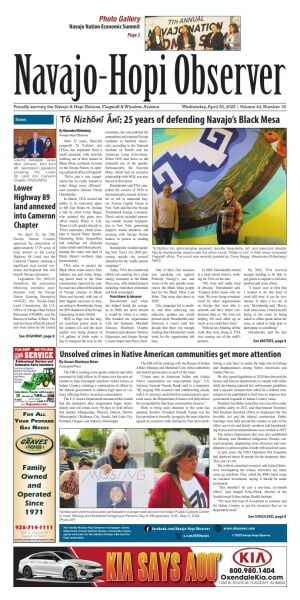PHOENIX — State lawmakers gave final approval April 8 to two measures designed to promote public health, but not before exempting themselves from one of them.
Without dissent, the Senate approved HB 2164 to eliminate certain artificial dyes and chemicals from what can be served and sold at public schools. That measure, already approved by the House, now goes to Gov. Katie Hobbs.
But HB 2165, a proposal to keep people from using their food stamps to purchase sodas, drew unanimous derision from Senate Democrats, particularly after their Republican counterparts refused to apply the same restrictions on the use of the taxpayer dollars they get in a daily allowance for their expenses while the Legislature is in session.
Both votes were purposely scheduled by the Republican Senate majority to occur Tuesday to coincide with a visit to the Capitol by Robert Kennedy Jr., the federal Health and Human Services secretary, specifically to discuss the measures.
Kennedy has promoted both ideas on the national level as part of his Make America Healthy Again agenda.
On Tuesday, he said health problems have been caused by corporations that re-engineered foods to make them not just tastier but also to get people to consume more, but without the nutrients. And Kennedy said there were other changes.
“One of the ways your brain tells you you’re full is it counts the number of times you chew,’’ he said. “So they began adding softeners to the food that trick your brain into never being able to tell your stomach that it’s full.’’
Kennedy also blamed a variety of other health conditions on additives, ranging from diabetes to autism.
But he was not taking questions on other controversies related to not just the actions of his agency nor on his own well-publicized statements on things like a recommendation that cities take fluoride out of their water to raising doubts about the safety of vaccines.
And as to the current outbreak of measles, the only thing Kennedy would say is that his agency’s strategy to deal with those cases “has been very successful.’’
“The number continues to grow by the day,’’ he said. “But the growth rate ... has diminished substantially.’’
In limiting questions to only food issues, Kennedy avoided addressing criticism by Will Humble, executive director of the Arizona Public Health Association, who said many of the actions he has taken are unwise and harmful. That includes urging cities to remove fluoride in tap water.
“Some are destructive and possibly illegal, like his $240 million in budget cuts for Arizona public health,’’ said Humble who previously served as the state health director. “Some are downright dangerous, like his opposition to vaccines and promotion of therapies that don’t work.’’
It also comes as state Attorney General Kris Mayes, along with Democratic counterparts in other states, has filed new lawsuits against Kennedy and his agency.
One challenges $11.4 billion in cuts in public health grants including about $239 million for Arizona. The administration countered that much of that dates back to the COVID pandemic and is a waste of tax dollars “responding to a non-existent pandemic that Americans moved on from years ago.’’
More recently, Mayes brought a new lawsuit after the Trump administration disrupted grant funding issued by the National Institutes of Health.
On Tuesday, responding to Kennedy’s visit, Mayes said he and Trump are exceeding their authority.
“We’re victims of an unconstitutional intrusion on the rights of states and the power of Congress by an out-of-control executive branch hellbent on destroying 250 years of precedent,’’ she said.
The more immediate purpose of Kennedy’s visit, though, was to praise the two measures that the Senate approved. But the Democrats took particular exception to SB 2165 to have the state determine what those who get benefits from the Supplemental Nutrition Assistance Program can purchase.
“At its core, this bill is paternalistic and judgmental,’’ said Sen. Lauren Kuby, D-Tempe. “This is food shaming.’’
Sen. Analise Ortiz pointed out that the measure, as originally crafted by Rep. Leo Biasiucci, also would have banned the use of food stamps for candies and sweets. That was dropped.
“I think it’s safe that we can assume that HB 2165 is just one step in that there will be future bills that will attack other types of foods that people consume,’’ said the Phoenix Democrat.
And Sen. Theresa Hatathlie suggested that there was a reason for singling out sodas and not going after other items that would remain legally eligible to purchase with food stamps.
Consider, said the Tuba City Democrat, breakfast cereals.
“What’s affordable down that aisle are the sugary huge bags of cereal,’’ Hatathlie said. “Why are we not having that discussion about how capitalistic strategies prey upon working families and also families that receive these benefits?’’
Asked about that issue, Kennedy did not disagree about the negative health effects of some of those items.
“You have to start somewhere,’’ he said.
“Believe me, I would like to stop the entire processed food program,’’ Kennedy said. “But we’re not going to do that overnight.’’
Anyway, he said that about 10% of food stamp purchases are for sugary drinks, calling any effort to eliminate them from what’s allowable “the quickest and most obvious thing to do.’’
And then there’s the name of the program includes the name “nutrition,’’ while sodas have none at all.
“If you’re spending nutritional money that is paid for by the taxpayers to make our kids healthy, and you’re buying something unhealthy with it, that needs to be corrected,’’ Kennedy said.
Hatathlie, in debating the issue at the Senate, said if the issue is the inherent unhealthy aspects of soda and the use of public funds to purchase them, then the same rules should apply to the daily allowance that lawmakers get to cover their expenses.
That proposal gained support from Sen. Priya Sundareshan.
“What we are talking about here is the inappropriateness or the appropriateness of providing taxpayer dollars towards the purchase of certain items,’’ said the Tucson Democrat. And she told colleagues that if they believe tax dollars shouldn’t be spent on unhealthy items, they should be consistent.
That comparison drew an objection from Sen. John Kavanagh.
“We go down a very dangerous road when we tell people how to spend money which is part of their compensation package,’’ said the Fountain Hills Republican who says that the daily expense allowance for lawmakers actually is part of their compensation. “It’s perfectly reasonable to tell people how to spend money when it’s part of a welfare benefit, especially when the prohibition promotes their health welfare.’’











